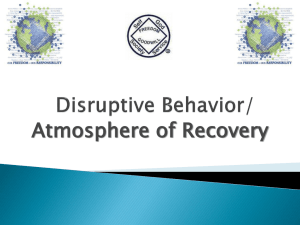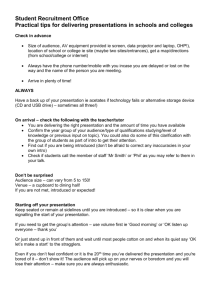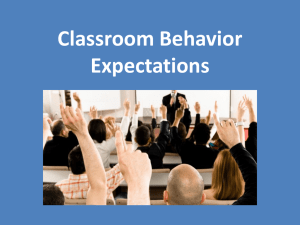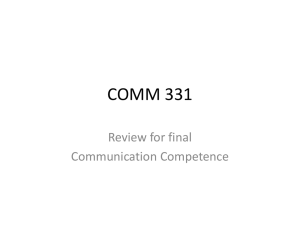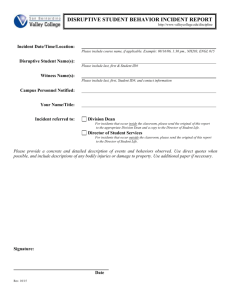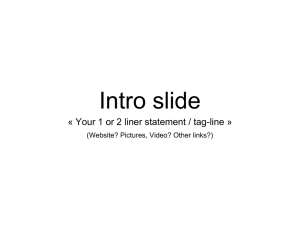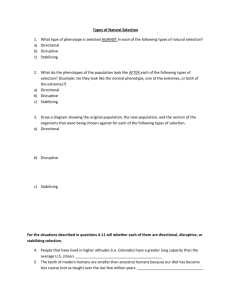Tips on Managing Disruptive Behavior in the Classroom
advertisement
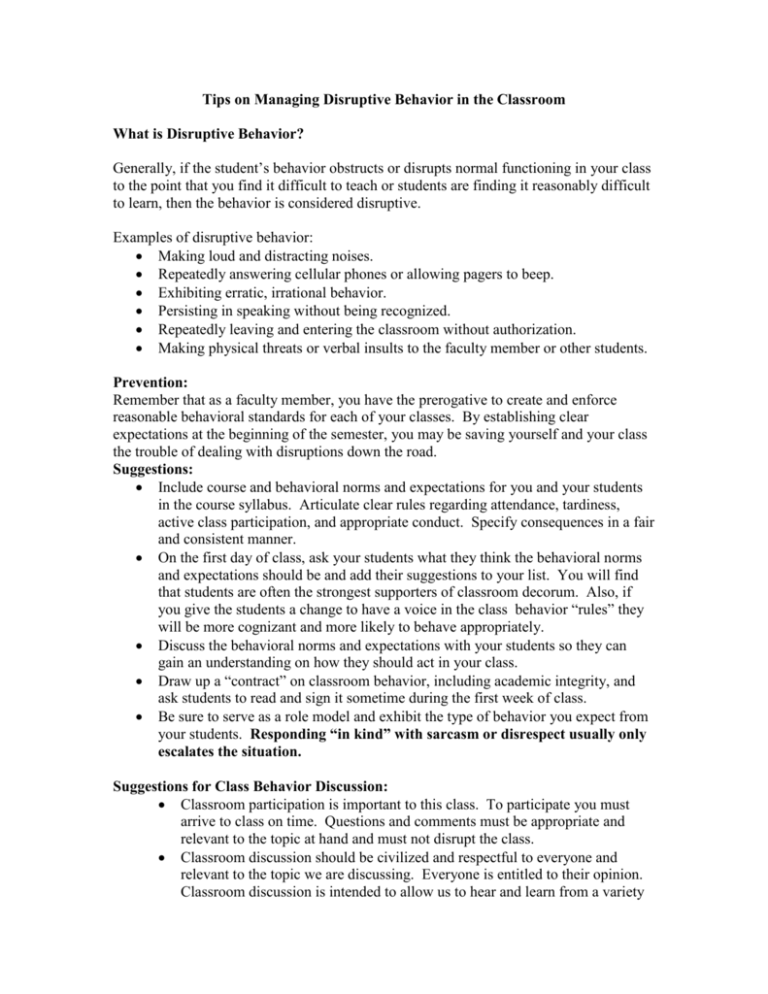
Tips on Managing Disruptive Behavior in the Classroom What is Disruptive Behavior? Generally, if the student’s behavior obstructs or disrupts normal functioning in your class to the point that you find it difficult to teach or students are finding it reasonably difficult to learn, then the behavior is considered disruptive. Examples of disruptive behavior: Making loud and distracting noises. Repeatedly answering cellular phones or allowing pagers to beep. Exhibiting erratic, irrational behavior. Persisting in speaking without being recognized. Repeatedly leaving and entering the classroom without authorization. Making physical threats or verbal insults to the faculty member or other students. Prevention: Remember that as a faculty member, you have the prerogative to create and enforce reasonable behavioral standards for each of your classes. By establishing clear expectations at the beginning of the semester, you may be saving yourself and your class the trouble of dealing with disruptions down the road. Suggestions: Include course and behavioral norms and expectations for you and your students in the course syllabus. Articulate clear rules regarding attendance, tardiness, active class participation, and appropriate conduct. Specify consequences in a fair and consistent manner. On the first day of class, ask your students what they think the behavioral norms and expectations should be and add their suggestions to your list. You will find that students are often the strongest supporters of classroom decorum. Also, if you give the students a change to have a voice in the class behavior “rules” they will be more cognizant and more likely to behave appropriately. Discuss the behavioral norms and expectations with your students so they can gain an understanding on how they should act in your class. Draw up a “contract” on classroom behavior, including academic integrity, and ask students to read and sign it sometime during the first week of class. Be sure to serve as a role model and exhibit the type of behavior you expect from your students. Responding “in kind” with sarcasm or disrespect usually only escalates the situation. Suggestions for Class Behavior Discussion: Classroom participation is important to this class. To participate you must arrive to class on time. Questions and comments must be appropriate and relevant to the topic at hand and must not disrupt the class. Classroom discussion should be civilized and respectful to everyone and relevant to the topic we are discussing. Everyone is entitled to their opinion. Classroom discussion is intended to allow us to hear and learn from a variety of viewpoints. This can only be achieved if we are respectful of one another and our differences. Side conversations that disrupt the class, my ability to teach, or students’ ability to learn will not be tolerated. In order to allow everyone to be heard, you must raise your hand to be recognized. All students are expected to be on time. Class ends at xxx time. Packing up your things early is disruptive to others around you and to myself. Any continued disruption of class will not be tolerated. I reserve the right to ask you to leave the classroom if your behavior is disrupting to others. Response: Unfortunately, every class at one time or another may experience a disruption. The following suggestions are intended to help minimize the negative impact of disruptions and address them in a professional and appropriate manner. In some cases, disruptive students do not realize they are bothering others. One suggestion is to move closer to the inattentive student, pause until everyone quiets down, and make direct eye contact. Then use general statements like “We have too may private conversations going on at this time; let’s focus on the same topic.” If the disruptive behavior does not stop, you may ask a particular student to refrain from the disruptive behavior. When the class is over, ask the disruptive student to see you after class or make an appointment with the student right then to come later if he/she has an immediate class to go to. When you meet with the student, explain why you consider this type of behavior inappropriate, stress your behavioral expectations of students, and warn the student that further occurrences of disruptive behavior may result in disciplinary action. Don’t get into a blaming match with the student. Instead use “I” statements. i.e. “When I see you talking while I am teaching, I feel as if others are not able to listen to the lecture and I need the activity to stop.” Document any discussions you have with the disruptive students. Document well the date, class, and the specific behavior. Then, document your conversation with the student and the student’s response. If the disruptive behavior persists, you may need to discuss the situation with the lead instructor or the dean of the department for the area in which you are teaching to discuss having the student leave the class. But always, always have good documentation to support your discussions to remedy the situation. Be consistent. Don’t allow some students to get away with disruptions and not others. If you are seeing a pattern of odd behavior and are concerned by it, consult the lead instructor or the dean of the department in which you are teaching. The dean may want to refer the student for counseling or consult a college counselor about the behavior. If a student is posing a threat to the safety of himself/herself or others or if the student becomes physically or verbally abusive, the security office at 838-6274 or 838-6275 should be contacted immediately. Err on the side of safety. The fact that a disruptive student may have a disability should not prevent you from acting on the disruptive behavior. Students with or without identified disabilities are to adhere to the WCC Code of Conduct found in the college catalog. The campus security may file an incident report and the accused student may be asked to see the Dean of Instruction for remedial discussions. Don’t be afraid to express yourself about disruptive behavior in your classroom. Most students want to learn and find disruptions irritating. You will be more respected if you take care of the disruptions up front and not allow the behaviors to continue.
